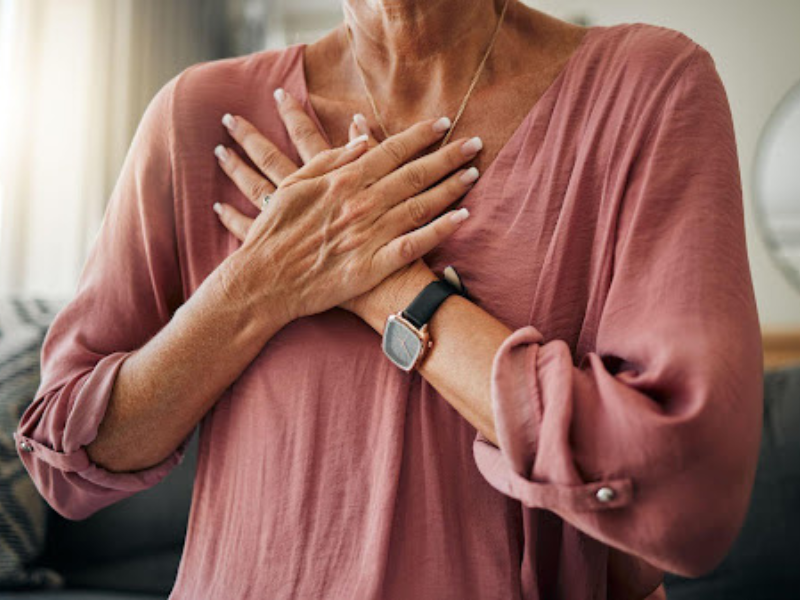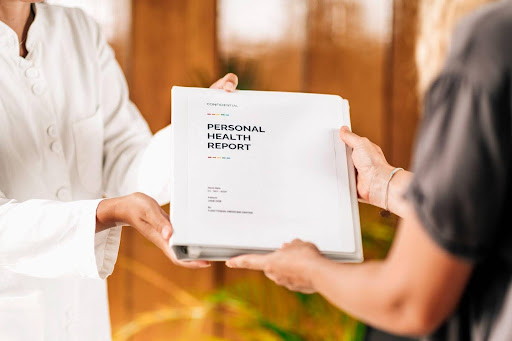
Menopause and Heart Palpitations: What You Need to Know
Menopause is a significant starting phase of aging women where they experience what they never had before. This phase is marked by the end of the monthly menstruation cycle and brings a range of physical and emotional changes.
While hot flushes, night sweats, mood swings, and anxiety are common symptoms and more pronounced during menopause, the sensation of a fluttering heartbeat can catch many women off guard.
Considering heart palpitations during menopause as a pressing issue, let’s dig into the connection between menopause and heart palpitation, understand insights into why they occur, their seriousness, how to manage them, and whether they seek medical advice like other menopausal symptoms do.
Connecting the Two Dots with Hormonal Storm
Heart palpitations are commonly characterized as fluttering, pounding, and skipping of beats and lead to irregular and abnormal heartbeat. Palpitations might be frightening, but they are usually not harmful; however, when they are accompanied by menopause, can cause significant anxiety, especially when they seem to come out of the blue.
The connection between two dots i.e., heart palpitation and menopause can be attributed to hormonal fluctuations, particularly the decline in estrogen levels.
Understanding the Science Behind Palpitation during Menopause
Estrogen in women’s bodies plays a crucial role in the proper functioning of the cardiovascular system and helps maintain healthy blood vessels, promoting good cholesterol levels and also supporting the heart’s electrical activity.
It helps maintain the QT interval by regulating the activity of ion channels that control the heart’s electrical activity and thereby protect the heart from irregular beating and arrhythmias and that’s how, maintains cardiovascular stability. Slumped estrogen levels during menopause impose irregular beating of the heart and potentially lead to heart palpitations.
What are the Triggers of Heart Palpitations during Menopause?
While hormonal fluctuations are the primary cause of heart palpitation during menopause, other factors exacerbate their occurrence. Such factors are:
- Hot Flushes: Menopausal women experiencing hot flashes suffer from excessive sweating which leads to dehydration. Moreover, disrupted temperature regulations in the body generate various fretful chemicals that adversely affect the heart functioning.
- Dehydration: Dehydration leads to an imbalance in body electrolytes e.g., the levels of sodium, potassium, calcium, and magnesium, etc., that affect heartbeat rhythm, making palpitations more likely.
- Intake of Caffeine: Consuming caffeine and nicotine stimulates the central nervous system, increasing heart rate and blood pressure, leading to faster or irregular heartbeat, which can be felt as palpitations.
- Alcohol Consumption: Having alcohol in higher amounts causes hangovers that increase heart rate and trigger palpitations. Further, it leads to dehydration and exacerbates the risk of heart palpitations.
- Medications: Certain medications including decongestants, medicines used to control thyroid, antidepressants, weight loss pills, and over-the-counter cold remedies increase heart rate by constricting the blood vessels, raising blood pressure, and causing irregular heartbeat.
- Anxiety and Stress: They are very often in menopause. Heart palpitation and anxiety run in a loop and cooperate. In simple words, we can say that palpitation causes anxiety and vice versa. It is proven in research that stress and anxiety trigger the release of adrenaline, which increases heart rate and leads to palpitation.
- Sleep Disturbances: Again one of the worst symptoms of menopause! Poor sleep during menopause increases stress and anxiety which in turn, triggers heart palpitations.
How to Manage Heart Palpitations during Menopause
Experiencing heart palpitations during menopause is indeed distressing nevertheless, there are several strategies that women can implement in their day-to-day lives to reduce the occurrence of palpitation episodes:
- Balanced Diet: Aging demands healthy food! Adopting a balanced diet rich in fruits, vegetables, whole grains, and proteins supports overall heart health. Likewise, reducing the intake of caffeine, alcohol, and high sugar and fat diets also helps minimize palpitations.
- Dedicated Exercises: Regular physical activity is very beneficial to heart health as it helps regulate the autonomic nervous system. Activities such as walking, swimming, running, and doing yoga are proven to reduce stress and improve cardiovascular health.
- Stay Hydrated: Taking plenty of water throughout the day is crucial for maintaining electrolyte balance and avoiding water loss during hot flashes and night sweats.
- Taking Proper Sleep: Prioritizing good sleep helps mitigate the effects of insomnia on heart health. Women experiencing symptoms of menopause should establish a regular sleep schedule and ensure a comfortable sleeping environment. It helps a lot in reducing palpitations.
- Manage Stress: Incorporating different breathing techniques, meditation, and muscle relaxation therapy helps calm the mind and reduce anxiety. These practices are very helpful in managing stress that may contribute to heart palpitations. CBT (cognitive behavioral therapy) is another regimen, effective in treating anxiety and stress.
- Medical Intervention: For medical interventions, HRT is preferred mostly because it stabilizes hormone levels and reduces the frequency of palpitations. It should be kept in mind that HRT is not suitable for everyone, and women must discuss the suitability, risks, and benefits before taking it with the healthcare providers. Medications like beta-blockers and anti-arrhythmic drugs are sometimes prescribed to normalize the palpitations. Doctors frequently prescribe electrolyte supplements for reducing the palpitations in limited dosing.
- Magnesium Supplementation: It is an essential element for proper muscle and nerve function, including the heart. Its deficiency leads to heart palpitation. Food supplements rich in magnesium like nuts, leafy veggies, and whole grains help regulate cardiac functions.
- Adopting Natural Remedies: Menopausal women should be particular about what they eat and how it affects their bodies. Including food rich in phytoestrogens like soy, flaxseeds, some legumes, lentils, and fruits in the diet curbs menopausal symptoms, including heart palpitations. The inclusion of phytoestrogen is considered safer than going for HRT.
- Aromatherapy: It is a holistic healing practice where essential oils of selected plants are used to promote physical and emotional well-being. It is beneficial in managing heart palpitations, especially when they are related to stress, anxiety, and hormonal changes. Lavender, ylang-ylang, and rose oil are most commonly used for relaxation, reducing stress, and stabilizing heartbeat.
What Preventive Measures should be Employed to Avoid/ Reduce Heart Palpitations during Menopause?
Keeping a Record of Health
Menopausal women who experience frequent palpitations should keep a record of their health in a diary or on smartphones about their symptoms. Noting the timing, duration, frequency, and potential triggers of palpitations can provide valuable information for healthcare providers and help identify patterns. Various mobile apps are now available where a woman can update about their triggered symptoms and can get valuable information from the app.
Regular Check-ups
Regular visits to doctors especially after a certain age are essential for monitoring the proper functioning of vitals including the heart. Women experiencing heart palpitations during menopause should discuss any new symptoms like chest pain, shortness of breath, or dizziness with their doctor.
When to Seek Medical Advice?
Although heart palpitations are just a symptom like others during menopause yet, if certain symptoms like severe chest pain, fainting, dizziness, difficulty breathing, palpitations of long duration, and more frequent are accompanying it, they warrant immediate medical attention.
These symptoms could indicate a more serious heart condition that requires treatment. Additionally, if palpitations are persistent and worsen over time, women must undergo tests to ensure there are no other underlying issues.
Final Takeaway
Menopause is a complex and transformative phase in a woman’s life and it brings significant hormonal changes that have far-reaching effects on the body. Heart palpitations, while often unsettling, are associated symptoms during menopause and have a direct connection with estrogen levels.
Understanding the link between menopause and heart palpitations can help women navigate the challenging symptoms with greater confidence. By adopting a healthy lifestyle, managing stress, and seeking appropriate medical care, the frequency and severity of heart palpitations can be reduced and overall well-being can be established.
Menopause may bring its share of challenges, but with the right knowledge and support, it is possible to manage symptoms effectively and embrace the new phase of life with resilience.
Citations
- Women’s Midlife Health (2021). Review of menopausal palpitations measures. doi: 10.1186/s40695-021-00063-6. Retrieved from https://www.ncbi.nlm.nih.gov/pmc/articles/PMC8167994/
- MedicalNewsToday (2023). Heart palpitations and menopause: What you need to know. Retrieved from https://www.medicalnewstoday.com/articles/317700
- Women’s Health (2022). Correlates of palpitations during menopause: A scoping review. doi: 10.1177/17455057221112267. Retrieved from https://www.ncbi.nlm.nih.gov/pmc/articles/PMC9289918/

Poonam Rawat










